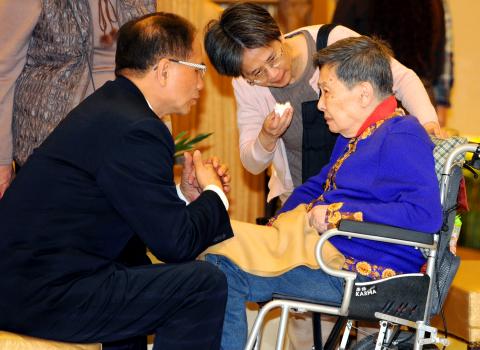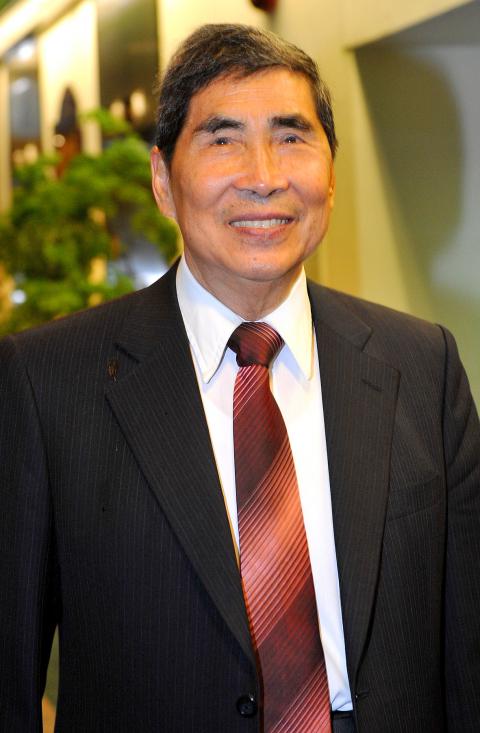Former Democratic Progressive Party (DPP) legislator Chai Trong-rong (蔡同榮), a strong advocate of Taiwan’s democracy and independence, died of multiple organ failure at National Taiwan University Hospital early yesterday morning. He was 78 years old.
The veteran politician was rushed to the National Taiwan University Hospital on Dec. 18 after he was found unconscious at his residence in New Taipei City’s (新北市) Banciao District (板橋). He was diagnosed to have suffered a brainstem hemorrhage and lapsed into a severe coma.
Chai never regained consciousness after emergency surgery and was declared dead yesterday.

Photo: Liao Chen-huei, Taipei Times
Correcting its earlier report that Chai died after his two daughters agreed to have his life support removed, Formosa Television (FTV), which Chai cofounded, said there was no such consent.
“The life support was not removed. It was a natural death,” FTV vice president Wang Ming-yu (王明玉) said.
No date has been set for a memorial ceremony, she added.

Photo: Chien Jung-fong, Taipei Times
Known as an earnest pro-independence activist, Chai served six terms in the legislature from 1993 to 2012. He was a member of the DPP’s Central Executive Committee.
In a Facebook post yesterday, DPP Chairman Su Tseng-chang (蘇貞昌) said: “From [his time] abroad to [his return to] Taiwan, party member Chai had dedicated his life to further democracy. Today we have lost a comrade that had long fought by our side.”
Su said Chai had the respect of party members due to his efforts to uphold the nation’s democracy, adding that the party would take up where Chai left off.
The party would also help Chai’s family in whatever way it can, Su added.
“It’s a loss for the country, because Chai had many political ideas and goals that he wanted to pursue,” Legislative Speaker Wang Jin-pyng (王金平) said yesterday.
Wang Jin-pyng said Chai helped push for legislation on the Referendum Act (公民投票法), which played an important role in Taiwan’s political development.
Also, Chai contributed a lot to Taiwan’s democratic movement and the development of Taiwan-US relations, and to the DPP as well, he said.
Numerous members from the pan-green camp, including Su, former DPP chairperson Tsai Ing-wen (蔡英文), former premier Frank Hsieh (謝長廷) and DPP caucus whip Ker Chien-ming (柯建銘) yesterday paid their final respects to Chai at a memorial service hall set up near the Taipei City First Funeral Parlor.
Meanwhile, in Washington, Formosan Association for Public Affairs (FAPA) president Mark Kao (高龍榮) said Chai won Taiwan’s respect with his pioneering initiatives and the respect of the US Congress with his determination and conviction to “make Taiwan a better place.”
FAPA is a Washington-based nonprofit organization, which Chai and several Taiwanese pro-independence activists co-founded in 1982 to seek worldwide support for Taiwan’s independence and for the interests of Taiwanese.
Chai was the organization’s first president in 1982.
Calling Chai a pioneer of democracy, Kao said the politician’s devotion to making Taiwan a better country has won him the respect of Taiwanese and the US Congress.
US Congressional leaders also expressed their sorrow on Friday at the news of Chai’s death.
“He was a good friend and a great Taiwanese patriot,” said the chairman of the US House of Representatives subcommittee on Asia, US Representative Steve Chabot.
Chabot said that he was “deeply saddened” by Chai’s death.
“Those of us in the Congress who advocate for the cause of Taiwanese freedom will miss him greatly,” Chabot said.
Former chairwoman of the House Foreign Affairs Committee US Representative Ileana Ros-Lehtinen said that as a lifelong friend of Taiwan and a founding member of the Congressional Taiwan Caucus, she remembered Chai as a “true leader.”
“He was a familiar face to many of us on Capitol Hill, where he would often meet with members of Congress to discuss the importance of freedom and democracy in Taiwan,” Ros-Lehtinen said.
Additional reporting by Rich Chang

SECURITY: As China is ‘reshaping’ Hong Kong’s population, Taiwan must raise the eligibility threshold for applications from Hong Kongers, Chiu Chui-cheng said When Hong Kong and Macau citizens apply for residency in Taiwan, it would be under a new category that includes a “national security observation period,” Mainland Affairs Council (MAC) Minister Chiu Chui-cheng (邱垂正) said yesterday. President William Lai (賴清德) on March 13 announced 17 strategies to counter China’s aggression toward Taiwan, including incorporating national security considerations into the review process for residency applications from Hong Kong and Macau citizens. The situation in Hong Kong is constantly changing, Chiu said to media yesterday on the sidelines of the Taipei Technology Run hosted by the Taipei Neihu Technology Park Development Association. With

CARROT AND STICK: While unrelenting in its military threats, China attracted nearly 40,000 Taiwanese to over 400 business events last year Nearly 40,000 Taiwanese last year joined industry events in China, such as conferences and trade fairs, supported by the Chinese government, a study showed yesterday, as Beijing ramps up a charm offensive toward Taipei alongside military pressure. China has long taken a carrot-and-stick approach to Taiwan, threatening it with the prospect of military action while reaching out to those it believes are amenable to Beijing’s point of view. Taiwanese security officials are wary of what they see as Beijing’s influence campaigns to sway public opinion after Taipei and Beijing gradually resumed travel links halted by the COVID-19 pandemic, but the scale of

A US Marine Corps regiment equipped with Naval Strike Missiles (NSM) is set to participate in the upcoming Balikatan 25 exercise in the Luzon Strait, marking the system’s first-ever deployment in the Philippines. US and Philippine officials have separately confirmed that the Navy Marine Expeditionary Ship Interdiction System (NMESIS) — the mobile launch platform for the Naval Strike Missile — would take part in the joint exercise. The missiles are being deployed to “a strategic first island chain chokepoint” in the waters between Taiwan proper and the Philippines, US-based Naval News reported. “The Luzon Strait and Bashi Channel represent a critical access

Pope Francis is be laid to rest on Saturday after lying in state for three days in St Peter’s Basilica, where the faithful are expected to flock to pay their respects to history’s first Latin American pontiff. The cardinals met yesterday in the Vatican’s synod hall to chart the next steps before a conclave begins to choose Francis’ successor, as condolences poured in from around the world. According to current norms, the conclave must begin between May 5 and 10. The cardinals set the funeral for Saturday at 10am in St Peter’s Square, to be celebrated by the dean of the College